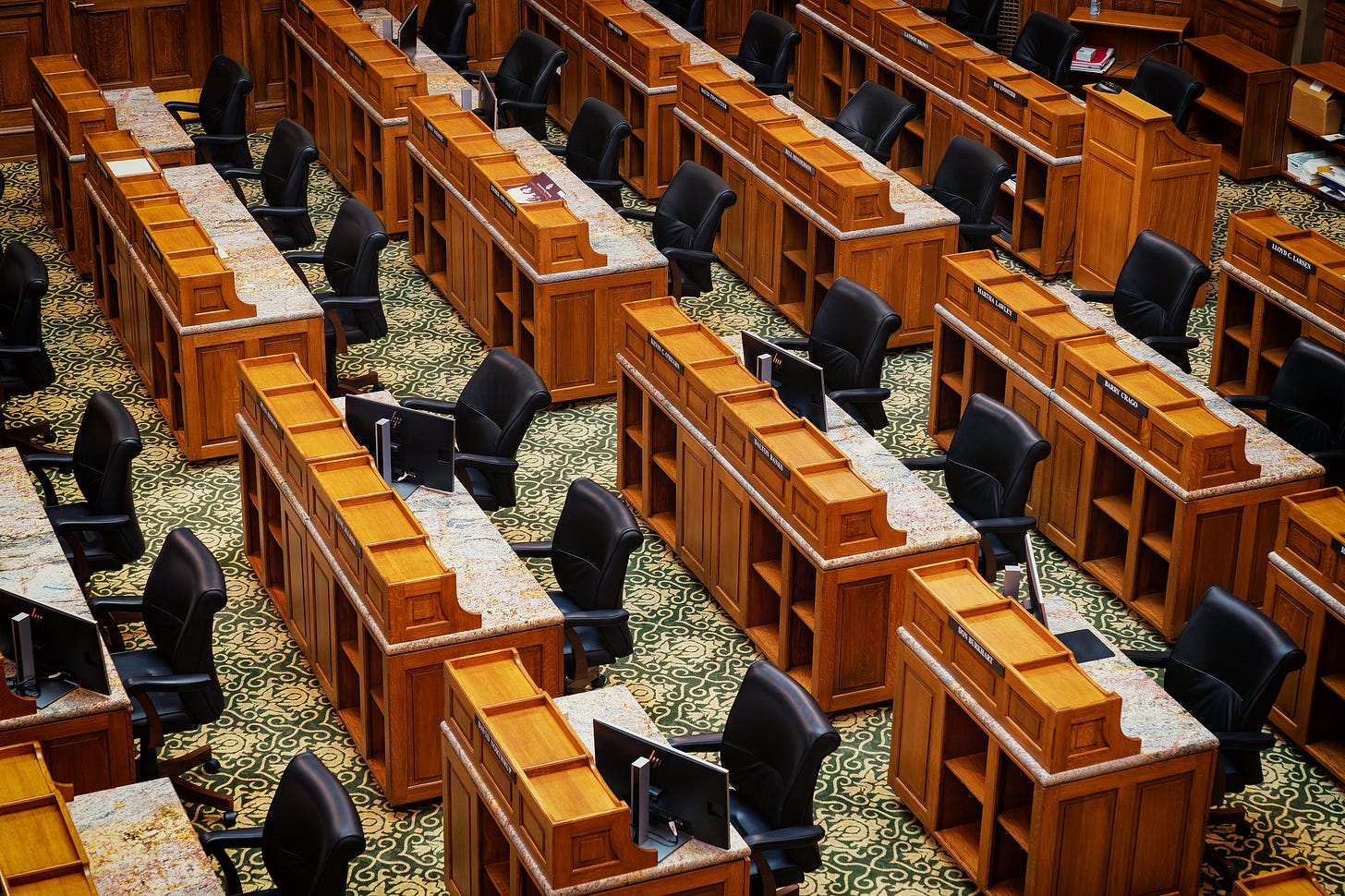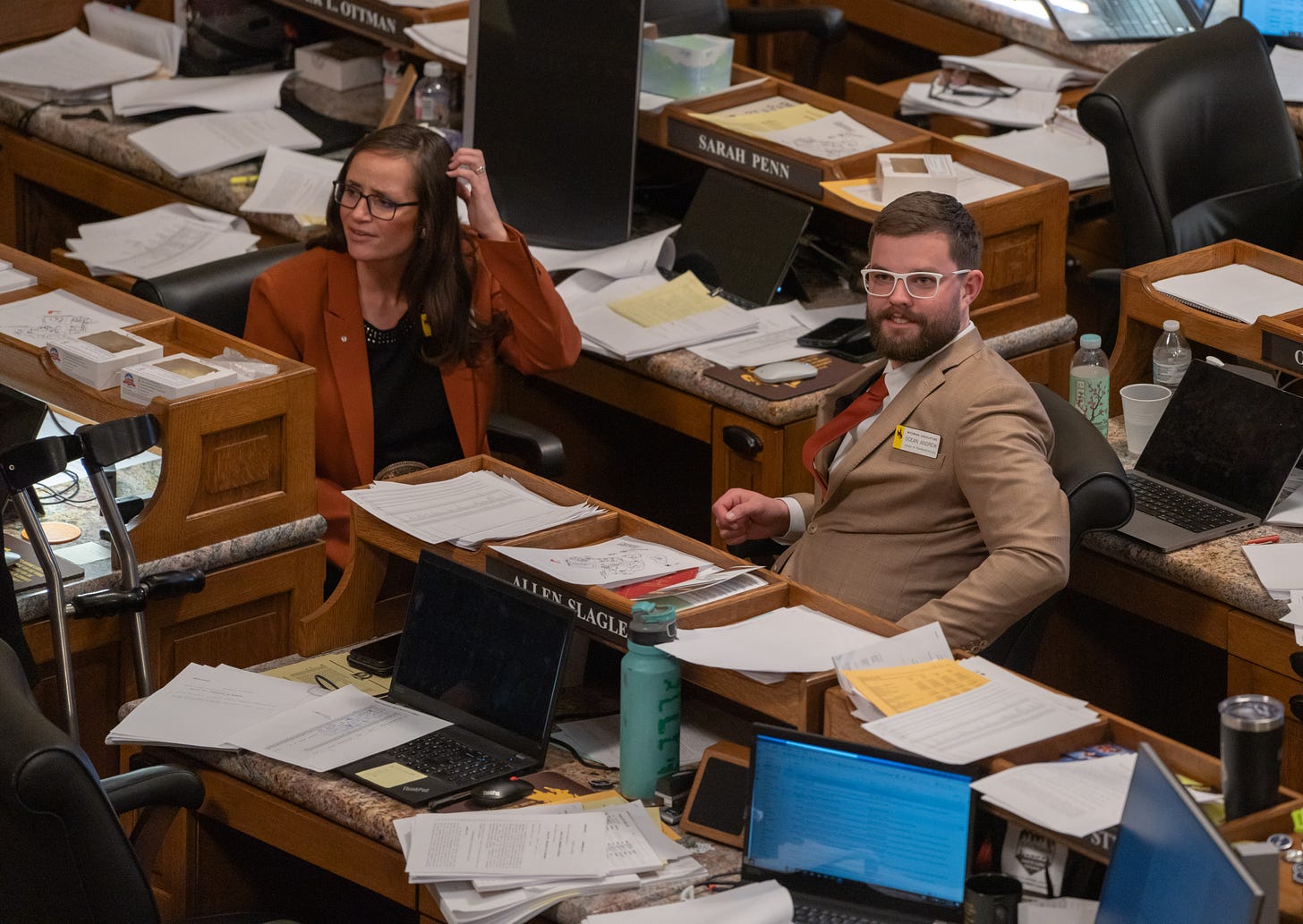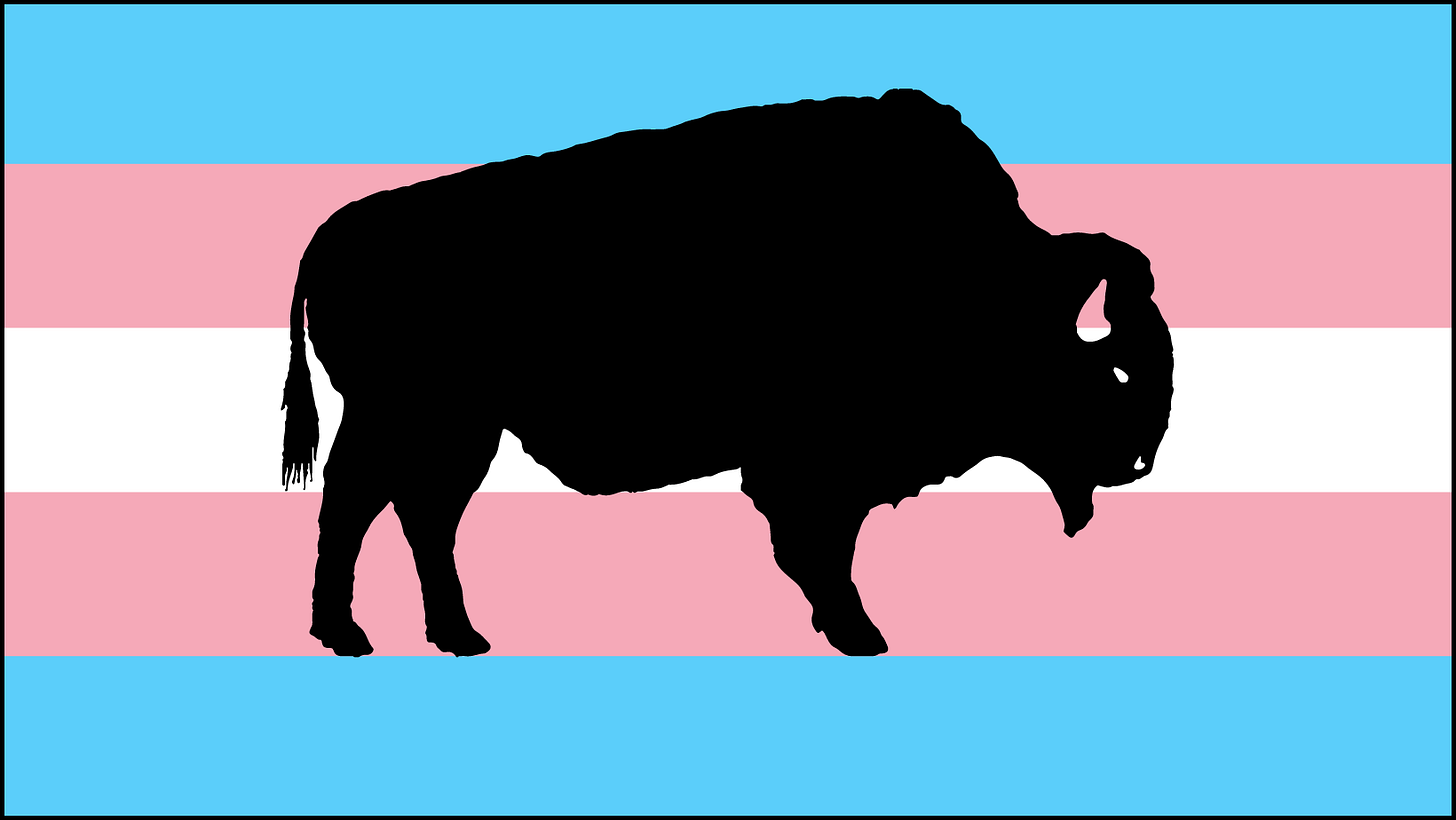Wyoming lawmakers aim to erode transgender rights
By limiting the minority’s legal recognition and participation in public life, a new far-right majority in the State Legislature could radically alter life for transgender Wyomingites.
Right-wing state lawmakers have filed half a dozen bills targeting transgender rights in Wyoming ahead of the 2025 General Session.
The bills seek to limit the inclusion of transgender people in public life by forbidding legal recognition in state law, excluding trans women from collegiate sports and dictating what bathrooms and other facilities they are allowed to use.
“The cruelty is the point,” said Sara Burlingame, executive director of Wyoming Equality. “It does not matter to them the harm it will do. They are passing these regardless.”
As the state’s main LGBTQ+ advocacy organization, Wyoming Equality will be lobbying against the slate of anti-trans bills coming down the pike. Burlingame herself is likely to testify when these bills show up individually in committee hearings. But she said she’ll be joined by “the mothers and fathers, grandmas and grandpas, aunts and uncles and the kiddos who are impacted” whenever members of the public have a chance to comment.
“Our people, Wyoming Equality, will be there in force,” Burlingame said. “Not because we believe it will slow down or stop these bills from passing, but because we think that the majority of people in Wyoming don’t understand how cruel and how unconstitutional the Freedom Caucus’ agenda is. And so it’s our job to highlight it and make it clear — so that people can make better choices at the polls in two years, and so that people can get organized and join like-minded folks.”
The Freedom Caucus is a right-wing coalition of state representatives who gained a majority in the Wyoming House during the 2024 election. They plan to crackdown on diversity efforts at the University of Wyoming and institute greater restrictions on voting in the name of election security, among other stated goals, but their members are also leading the crusade to pass more anti-trans legislation during the session that starts tomorrow.
Albany County’s Rep. Ocean Andrew (HD-46) — the only member of the county’s delegation to be allied with the Freedom Caucus — is a co-sponsor on several of the bills.
Wyoming is one of 12 states with a Freedom Caucus. It is the only state in which that caucus has gained an outright majority.
Yet the bills are not unique.
Across the nation, anti-LGBTQ+ legislation — some nearly identical to the legislation that has passed or is being tried in Wyoming — has exploded in recent years.

The Cowboy State’s ascendent far-right is hoping to build on the three anti-trans bills passed in Wyoming since 2023. State Statutes now outlaw the highest standard of medical care for trans youth, require school counselors to out transgender or gay students even to unsupportive families, and ban transgender women and girls from participating in high school sports.
But the wave of new legislation proposed this year could go further — declaring in state law that sex and gender are one and the same, forbidding the University of Wyoming from playing against teams that allow trans women, and empowering certain individuals to sue government employees who require the use of preferred pronouns or who fail to segregate university dorms by reproductive capacity.
None of the six bills highlighted below are “committee bills.” That means none of them have been “worked” by lawmakers during the interim and none of them have the backing of an official legislative panel.
Historically, committee bills have had an easier time moving through the legislature since lawmakers have already spent hours investigating the topic and polishing the legislation.
Each of the bills highlighted below is instead sponsored by an individual lawmaker, or by multiple lawmakers. The distinction between individual and committee bills might matter less this year, as the right-wing Freedom Caucus takes control of the House and gets to set its own agenda.
“I think they believe they are speaking for a majority of people,” Burlingame said. “And I just — I fundamentally don’t believe that.”
Redefining gender and battling pronouns

HB32 - What Is A Woman Act
The What is a Woman Act would declare in state law that sex and gender are determined by sex organs “and/or” chromosomes.
Sex organs and chromosomes are part of how scientists define sex, but they do not factor into the definition of gender. Whereas sex typically refers to anatomy and hormones, gender typically refers to one’s identity and the roles one is expected to assume in the world at large.
But the What is a Woman Act equates terms traditionally referring to gender or presentation (such as man and woman) with terms that typically refer to sex (such male and female) — effectively defining sex and gender as one and the same. That’s a notion rejected not just by the National Institutes of Health, but by every leading medical and psychological authority — and even dictionaries.
The bill offers only one caveat and doesn’t delve into the details. It’s a carveout for the 1-2% of the population born intersex.
“A person born with a medically recognized condition of a ‘disorder or difference in sex development’ shall be provided legal protections and accommodations afforded under the Americans with Disabilities Act, as amended, and any other applicable Wyoming law,” the bill states.
The What is a Woman Act enables the state and its agencies or subdivisions, like cities and counties, to “recognize or enforce distinctions between the sexes” when it comes to sports, prisons, crisis centers, locker rooms and restrooms.
“With respect to biological sex, separate accommodations are not inherently unequal,” the bill states.
The act is sponsored by Casper Rep. Jayme Lien (HD-38). It is identical to another bill filed last year which failed introduction. That earlier failure doesn’t mean the bill is unpopular however. During a budget session like 2024, bills need to receive a two-thirds vote from the chamber to survive introduction. The 2024 What Is A Woman Act failed to reach this required supermajority, despite roughly 60% of the House voting in its favor.
In 2025, the bill will need a simple majority to clear introduction.

SF77 - Compelled speech is not free speech
Senate File 77 forbids the state or its agencies, as well as local governments, from requiring that employees respect each other’s pronouns.
The bill declares: “The state and its political subdivisions shall not compel or require an employee to refer to another employee using that employee’s preferred pronouns” as a condition of employment or in order to receive grants or other benefits.
The bill would also strip public employees of the civil immunity they usually enjoy in the performance of their official duties. This means aggrieved parties — government employees told they must respect preferred pronouns — could sue the colleagues who tried to require it.
“Any person aggrieved by a violation of subsection (a) of this section may file a civil action in any court of competent jurisdiction against the state or any political subdivision, and its employees acting in their official capacities, responsible for the violation to recover appropriate relief, including injunctive or declaratory relief, compensatory damages, reasonable attorney fees and court costs,” the bill states.
Senate File 77 is sponsored by Cheyenne Sen. Lynn Hutchings (SD-5) and co-sponsored by various allies and members of the Freedom Caucus, including Albany County Rep. Ocean Andrew (HD-46).
Legislating bathrooms and other public spaces

HB72 - Protecting women’s privacy in public spaces act
House Bill 72 would mandate that correctional and educational facilities segregate by sex every “changing area, restroom and sleeping quarters” meant to be used by more than one person.
The bill defines “female” as “a person who has, had, will have or would have had, but for a congenital anomaly or intentional or unintentional disruption, the reproductive system that at some point produces, transports and utilizes eggs for fertilization,” while defining “male” almost verbatim with “sperm” replacing “eggs.”
The bill declares, “[n]o person shall enter a changing area, restroom or sleeping quarters that is designated for males or females unless the person is a member of that sex,” and carves out exceptions for medical emergencies and for unisex areas meant for a single occupant. It provides no exception for instances in which individuals are invited into areas designated for the opposite sex.
Many of the proposal’s provisions apply to both correctional facilities like jails and prisons and educational facilities — including schools, colleges and the University of Wyoming. But the bill is more detailed about its rules for educational facilities and allows for certain accommodations, presumably for transgender individuals:
Each educational facility shall provide a reasonable accommodation to any person who is unwilling or unable for any reason to use a changing area or restroom designated for the person’s sex and located within an educational facility, or multi‑occupancy sleeping quarters while attending an activity sponsored by the educational facility, and who makes a written request to the public school for the reasonable accommodation. A reasonable accommodation granted under this subsection shall not include access to a changing area, restroom or sleeping quarters that is designated for use by members of the opposite sex while persons of the opposite sex are present or could be present.
Under the bill, anyone “who, while accessing a changing area, restroom or sleeping quarters designated for use by the person’s sex, encounters a person of the opposite sex” may sue the school, college or university so long as they bring the lawsuit within four years of the initial incident.
“Any person who prevails in an action … may recover from the educational facility five thousand dollars ($5,000.00) for each instance that the person encountered a person of the opposite sex while accessing a changing area, restroom or sleeping quarters designated for use by the person’s sex,” the bill states. “The person may also recover monetary damages from the educational facility for all harm suffered.”
Like the pronoun bill detailed above, House Bill 72 would also strip public employees of the legal protection from lawsuits they typically have when performing official duties.
HB72 is sponsored by Worland Rep. Martha Lawley (HD-27) and co-sponsored by 14 other lawmakers, including Albany County Rep. Ocean Andrew (HD-46).
SF62 - Restrooms in publicly funded schools
Senate File 62 requires school districts across the state to designate every restroom or locker room meant for more than a single occupant as exclusively male or female. It also requires school boards to establish policies punishing those who “refuse to comply.”
The bill further requires those school districts to offer “reasonable accommodation to any person who does not wish to use a multiple occupancy restroom or changing room” by providing them a single-occupancy alternative.
The proposal includes exceptions for custodians and maintenance staff, for coaches in certain circumstances, and for anyone aiming to render medical assistance in the event of an emergency.
The bill is sponsored by Powell Sen. Dan Laursen (SD-19), who has played a key role in the passage of other anti-trans legislation in the last two years. It’s co-sponsored by 18 other lawmakers across both chambers.
Expanding sports ban to intramurals, UW, other universities

HB60 - Student eligibility in sports - amendments
In 2023, state lawmakers broke with a long tradition of approaching LGBTQ+ issues with a “live and let live” mentality. That is to say they passed neither affirmative bills defending the rights of gay and transgender residents nor restrictive bills scaling back those rights.
The bill that upended that tradition prohibited transgender women and girls from competing on high school sports teams consistent with their gender identity. Gov. Mark Gordon called the bill “draconian” and “discriminatory” but declined to veto it, letting it pass into law without his signature.
This year’s House Bill 60 would make the new law even more extreme. The proposal:
Broadens the scope of the ban to encompass the state’s community colleges and the University of Wyoming, whereas previously it only applied to K-12 public schools;
Removes the word “interscholastic” from key locations in the 2023 law such that it will expand the ban to encompass all athletic activities, including intramural sports, whether or not they include competition between schools.
Specifies that students, parents and schools may sue athletic associations if they violate the transgender sports ban.
Includes the additional prohibition that: “No school shall participate in any athletic activity designated for students of the female sex with or against a team that the school knows or, to a reasonable degree of certainty believes, has on the team a student of the male sex.”
Like the bathroom bill detailed above, House Bill 60 is sponsored by Worland Rep. Martha Lawley (HD-27) and co-sponsored by 15 other lawmakers, including Albany County Rep. Ocean Andrew (HD-46).
SF44 - Fairness in sports - intercollegiate athletics
Senate File 44 would require “students at the University of Wyoming and Wyoming community colleges to compete in intercollegiate athletic competitions based on their biological sex” — which is defined by the bill as being the sex stated on one’s birth certificate.
SF44 states:
Except as provided in subsection (c) of this section, no educational institution shall allow … [a] student to compete in an athletic competition sponsored or authorized by the educational institution that is designated for the sex opposite to the student’s sex [or] … [a] male student to compete in an athletic competition that is mixed‑sex in a position that is designated by rule or procedure for female students.
With subsection (c) adding:
An educational institution may allow a female student to compete in an athletic competition that is designated for male students if a corresponding athletic competition designated for female students is not offered or available.
Senate File 44 is sponsored by Evanston Sen. Wendy Schuler (SD-15) and co-sponsored by five other lawmakers.





Most of these bills appear to be sponsored by people from the least interesting and economically unvileable parts of the state.
Wyoming people who are transgender have that right and far more under Secs. 17 and 36 of the Wyoming Constitution. Lawmakers twerking energetically for their Lord Gray, Wyoming's Tomás de Torquemada, haven't yet read that far.